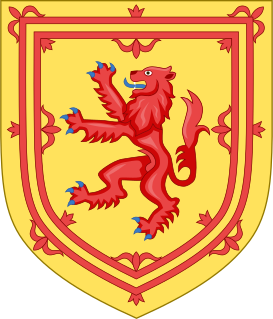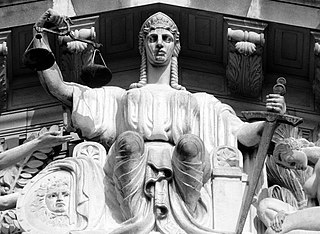Small-claims courts have limited jurisdiction to hear civil cases between private litigants. Courts authorized to try small claims may also have other judicial functions, and go by different names in different jurisdictions. For example, it may be known as a county or magistrate's court. These courts can be found in Australia, Brazil, Canada, England and Wales, Hong Kong, Ireland, Israel, New Zealand, Philippines, Scotland, Singapore, South Africa and the United States.

The courts of Scotland are responsible for administration of justice in Scotland, under statutory, common law and equitable provisions within Scots law. The courts are presided over by the judiciary of Scotland, who are the various judicial office holders responsible for issuing judgments, ensuring fair trials, and deciding on sentencing. The Court of Session is the supreme civil court of Scotland, subject to appeals to the Supreme Court of the United Kingdom, and the High Court of Justiciary is the supreme criminal court, which is only subject to the authority of the Supreme Court of the United Kingdom on devolution issues and human rights compatibility issues.

Under the Constitution of Finland, everyone is entitled to have their case heard by a court or an authority appropriately and without undue delay. This is achieved through the judicial system of Finland.
Australian administrative law defines the extent of the powers and responsibilities held by administrative agencies of Australian governments. It is basically a common law system, with an increasing statutory overlay that has shifted its focus toward codified judicial review and to tribunals with extensive jurisdiction.

There are various levels of judiciary in England and Wales — different types of courts have different styles of judges. They also form a strict hierarchy of importance, in line with the order of the courts in which they sit, so that judges of the Court of Appeal of England and Wales are generally given more weight than district judges sitting in county courts and magistrates' courts. On 1 April 2020 there were 3,174 judges in post in England and Wales. Some judges with United Kingdom-wide jurisdiction also sit in England and Wales, particularly Justices of the United Kingdom Supreme Court and members of the tribunals judiciary.
Law enforcement in Sweden is carried out by several government agencies, under the guidance of the Government of Sweden.

The judiciary of the United Kingdom are the separate judiciaries of the three legal systems in England and Wales, Northern Ireland and Scotland. However, the judges of the Supreme Court of the United Kingdom, the Special Immigration Appeals Commission, Employment Tribunals, Employment Appeal Tribunal and the UK tribunals system do have a United Kingdom–wide jurisdiction. In employment law, employment tribunals and the Employment Appeal Tribunal have jurisdiction in the whole of Great Britain.

The Ministry of Justice (MoJ) is a ministerial department of the British Government headed by the Secretary of State for Justice and Lord Chancellor. The department is responsible for areas of constitutional policy not transferred in 2010 to the Deputy Prime Minister, human rights law and information rights law across the UK.

The Tribunals, Courts and Enforcement Act 2007 is an Act of the Parliament of the United Kingdom. It provides for several diverse matters relating to the law, some of them being significant changes to the structure of the courts and fundamental legal procedures. Part 1 provides a scheme for radical overhaul of the tribunal system in the UK, creating a new unified structure with two new tribunals to embrace the former fragmented scheme, along with a Senior President of Tribunals. Part 2 defines new criteria for appointment as a judge, generally reducing the length of experience required with the aim of increasing diversity in the judiciary. Part 3 creates a new system of taking control of goods in order to enforce judgments and abolishes ancient common law writs and remedies such as fieri facias, replevin and distress for rent. It introduces a modern system of 'certified enforcement agents' and 'exempted enforcement agents' which includes civil servants such as court officers and County Court bailiffs, civilian enforcement officers and police officers. Part 4 makes some changes to attachment of earnings and charging orders to make recovery of debts more straightforward. Part 5 makes some changes to insolvency practice in order to provide low-cost protection for people who have previously been excluded owing to their small debts and lack of assets. Part 6 provides protection from seizure for foreign antiquities and artefacts on display in the UK and whose provenance is alleged to be broken by misappropriation. Such artefacts can only be seized on a court order that was compelled by a Community obligation or a treaty obligation.
The Senior President of Tribunals is a senior judge in the United Kingdom who presides over the UK tribunal system. The Senior President is appointed by the Queen on the advice of the Lord Chancellor following the recommendation of an independent selection panel under the auspices of the Judicial Appointments Commission. Lord Justice Carnwath was appointed as the first holder of the post on 12 November 2007. The Senior President must satisfy the judicial-appointment eligibility condition on a seven-year basis, or have had similar experience in Scotland or Northern Ireland. The Senior President must have regard to the need for the following:
The tribunal system of the United Kingdom is part of the national system of administrative justice with tribunals classed as non-departmental public bodies (NDPBs).

The judicial system of Sweden consists of the law of Sweden and a number of government agencies tasked with upholding security and rule of law within the country. The activities of these agencies include police and law enforcement, prosecution, courts, and prisons and other correctional services.

The Courts and Legal Services Act 1990 was an Act of the Parliament of the United Kingdom that reformed the legal profession and courts of England and Wales. The Act was the culmination of a series of reports and reforms that started with the Benson Commission in the 1970s, and significantly changed the way that the legal profession and court system worked.

The remedies available in Singapore administrative law are the prerogative orders – the mandatory order, prohibiting order (prohibition), quashing order (certiorari), and order for review of detention – and the declaration, a form of equitable remedy. In Singapore, administrative law is the branch of law that enables a person to challenge an exercise of power by the executive branch of the Government. The challenge is carried out by applying to the High Court for judicial review. The Court's power to review a law or an official act of a government official is part of its supervisory jurisdiction, and at its fullest may involve quashing an action or decision and ordering that it be redone or remade.

Administrative law in Singapore is a branch of public law that is concerned with the control of governmental powers as exercised through its various administrative agencies. Administrative law requires administrators – ministers, civil servants and public authorities – to act fairly, reasonably and in accordance with the law. Singapore administrative law is largely based on English administrative law, which the nation inherited at independence in 1965.

Scots law is the legal system of Scotland. It is a hybrid or mixed legal system containing civil law and common law elements, that traces its roots to a number of different historical sources. Together with English law and Northern Irish law, it is one of the three legal systems of the United Kingdom.

Threshold issues are legal requirements in Singapore administrative law that must be satisfied by applicants before their claims for judicial review of acts or decisions of public authorities can be dealt with by the High Court. These include showing that they have standing to bring cases, and that the matters are amenable to judicial review and justiciable by the Court.

Exclusion of judicial review has been attempted by the Parliament of Singapore to protect the exercise of executive power. Typically, this has been done though the insertion of finality or total ouster clauses into Acts of Parliament, or by wording powers conferred by Acts on decision-makers subjectively. Finality clauses are generally viewed restrictively by courts in the United Kingdom. The courts there have taken the view that such clauses are, subject to some exceptions, not effective in denying or restricting the extent to which the courts are able to exercise judicial review. In contrast, Singapore cases suggest that ouster clauses cannot prevent the High Court from exercising supervisory jurisdiction over the exercise of executive power where authorities have committed jurisdictional errors of law, but are effective against non-jurisdictional errors of law.

An ouster clause or privative clause is, in countries with common law legal systems, a clause or provision included in a piece of legislation by a legislative body to exclude judicial review of acts and decisions of the executive by stripping the courts of their supervisory judicial function. According to the doctrine of the separation of powers, one of the important functions of the judiciary is to keep the executive in check by ensuring that its acts comply with the law, including, where applicable, the constitution. Ouster clauses prevent courts from carrying out this function, but may be justified on the ground that they preserve the powers of the executive and promote the finality of its acts and decisions.











